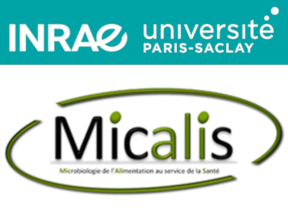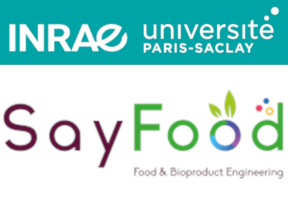FUNDING: French National Research Agency (ANR)
TOTAL BUDGET: 770 k€
NUMBER OF PARTNERS: 6
Our consortium represents a highly interdisciplinary grouping of academic or private laboratories necessary for the integrative use of multiscale data for the understanding of food microbial ecology. In particular, the consortium was built to gather six important scientific task forces.
The first involves the genomic expertise on many food microorganisms.
The second involves the bioinformatic processing of 'omics' data including bioinformatics facilities.
The third is the involvement of biostatisticians and modellers that will enable the development of a conceptual ecology approach in the construction of experimental designs and in the statistical data analysis.
The fourth involves the association, within the project, of four metabolomic platforms with complementary technologies. Such broad analytical capacity is one of the assets for the achievement of the objectives related to the characterization of molecules resulting from microbial interactions during fermentations.
The fifth involves the support and know-how of several institutional microbiological resource centres allowing the capacity to exploit the diversity of hundreds of strains characterized at the genomic level.
 | Food and Gut Microbiology for Human HealthStéphane Chaillou (Coordinator) - email: stephane.chaillou@inrae.frMICALIS institute (UMR1319) in Jouy-en-Josas, employs about 300 persons in 20 teams, whose main objective is to develop studies on microbiology for human health and safety of food. Two teams will join their expertise in genomic, metagenomic, biostatistics, bioinformatic and microbial ecology: FME (Food Microbial Ecology, hosting the coordinator of METASIMFOOD) and PHAGES (Dynamics of Bacteriophages Genomes). | |
| ||
 | Paris-Saclay Food and Bioproduct EngineeringEric Dugat-Bony - email: eric.dugat-bony@inrae.frSayFood laboratory (UMR782) in Saclay brings together 120 persons with highly multidisciplinary skills in microbiology, process engineering, chemistry and physical chemistry, consumer sciences, modelling and applied mathematics. Scientific leaders from team CoMiaL (Food Microbial Communities) will bring expertise in ecological engineering, microbial biochemistry and molecular biology. | |
| ||
 | MAthematics and computer scIence Applied from the Genome to the EnvironmentMahendra Mariadassou - email: mahendra.mariadassou@inrae.frMaIAGE laboratory (UMR1404) in Jouy-en-Josas, is composed of about 60 mathematicians, statisticians and bioinformaticians around biological questions ranging from molecular biology to ecosystems. In the past few years, the laboratory has acquired an expertise in the field of metagenomics and metabarcoding. MaIAGE is hosting the Migale bioinformatics facility, which provides access and support for bioinformatics and biostatistical analysis. | |
| ||
 | Food Technology Resource Centre (ITAI)Marie-Hélène Desmonts – email: mh.desmonts@aerial-crt.comThe Aerial team is composed of 27 persons (PhDs, engineers and technicians) and has developed expertise in food ionization, food microbial quality and food safety. Aerial is a privileged partner of the food industry, especially in Alsace district, which is a very important asset for the diffusion of the results to food industries and for setting up pilot scale fermentations. Aerial has also recently developed skills and analytical power in metabolomic analysis in complex food matrices. | |
| ||
 | Oenology Research UnitWarren Albertin – email: warren.albertin@u-bordeaux.frOenology Laboratory (EA 4577; UMR1366 INRAE) is a research unit of the Institute of Vine and Wine Sciences of Bordeaux University. It gathers about 90 persons and 3 teams carrying out finalized and knowledge scientific research and development of innovative know-how for the wine sector. The scientific fields of the unit covers grape and wine chemistry, microbiology, biochemistry, oenological processes, biological properties of phenolic compounds and cognitive sciences within the framework of sensory analysis. UR OENO also hosts the resource centre OENOLOGY (ECCO member) dedicated to grape and wine microorganisms (above 3,000 yeasts and bacterial strains). | |
| ||
 | International Centre for Microbial Resources on Food BacteriaFlorence Valence-Bertel - email: florence.valence-bertel@inrae.frCIRM-BIA (UMR 1253) is Biological Resource Center dedicated to preserving, characterizing and promoting the bacterial diversity related to fermented foods and biopreservation. The Center’s collection contains more than 4,000 strains of bacteria from various biotopes (160 species, 30 genera). The strains are selected in order to offer the greatest possible diversity, from both the taxonomic and functional points of view, so as to ensure their usefulness to the scientific and industrial communities. The CIRM-BIA is ISO 9001 certified and has an expertise in molecular taxonomy of bacteria of food interest and the investigation and exploitation of the bacterial diversity of various fermented foods. |

